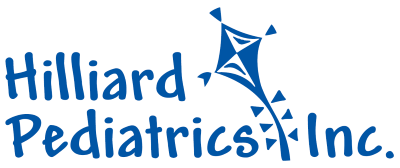Earaches and Ear Infections
Hilliard Pediatrics, Inc. - Dr. Tricia Lucin, MD
Introduction
Earaches and ear pain are a common complaint in a pediatric office and can have many causes. An earache can be caused by an ear infection, but not necessarily, which means we often need to evaluate earaches in the office to determine the cause and treatment. For your child's best care, we will not call in antibiotics for your child without being seen. While waiting for your office visit, routine use of ibuprofen and tylenol might be helpful for pain control, as well as a warm washcloth to the outer ear, or an ice pack depending on your child's preferences.
Symptoms, Causes, and Treatment
Ear infections, which are actually an infection of the middle ear space behind the ear drum (called acute otitis media or AOM) are a common cause of ear pain in children. AOM can be viral or bacterial in cause and cause pain typically deep within the ear. These might also cause fever, nasal draininge, decreased bottle or breastfeeding in infants, and crying in apparent pain when trying to lay flat at night. Some infants and children are more prone than others to ear infections. Even though most are not preventable, keeping your infant or child away from cigarette smoke is an important health measure that can decrease risk of ear infections. Swimming does not cause this type of infection. Typically AOM is treated with oral antibiotics to help the body fight off the bacteria causing infection. Occasionally the pressure behind the ear drum will become so high that the ear drum will rupture, which causes thick, milky drainage to come out of the ear, which will need evaluated for healing. Acetaminophen or ibuprofen can be helpful to decrease pain associated with ear infections. If your child has repeated ear infections, we might recommend that they see an otolaryngologist (ENT or Ear, Nose & Throat doctor) to consider tubes, which allow the middle ear to aerate and hopefully prevent some future ear infections.
Middle ear fluid (otitis media with effusion) can cause pain, fullness, decreased hearing, and popping or crackling sounds. Middle ear fluid can be caused by cold viruses and allergies, so typical nasal drainage, cough, congestion and sneezing might also be present. Antibiotics will not help this fluid, but because it can be caused by allergies, we might trial an allergy nasal spray to see if this helps the fluid clear. Middle ear fluid can be a setup for ear infections to develop in the right setting.
Swimmer's ear is an infection of the ear canal and external earlobe (otitis externa), typically several days after swimming or extensive bathing. The pain of the outer ear is intense, worse with touching the area or attempting to sleep with that side of the head on the pillow. Typically children have no cold sypmtoms with this type of ear infection. The bacteria that cause swimmer's ear are different than those that cause middle ear infections and are typically treated with antibiotic drops to the outside ear canal. Ibuprofen and acetaminophen can also help decrease pain. If you are being treated with ear drops for swimmer's ear, you should stay out of the pool for 2-3 days or use molded earplugs to keep water out of the ear, but in general, this is not needed or helpful longterm. The over-the-counter swimmer's ear drops available are fine for prevention of swimmer's ear by helping to dry out the ear after swimming, but they do not treat the infection once it has started.
Earwax can also cause ear discomfort. Often this will be described with decreased hearing, "fullness" of the ear, itchy ear, and parents might note earwax to the outside of the ear. Typically pain is not severe, but can be worse than you expect. Q-tips® make earwax worse, essentially shoving it farther into the ear and packing it together, so put those away! Even though earwax can be protective to the ear, too much is bothersome, so if we determine that is the cause, we will try to remove some in the office and make recommendations on what you can do at home to help. Some common over-the-counter treatments are Debrox®, hydrogen peroxide, and mineral oil. Each of these can be used daily to help loosen the earwax which will then fall out of the ear canal. Manually remove only what you can reach with your pinky finger.
Teething in infants can cause similar symptoms to ear infections, including fussiness when laying flat, clear nasal drainage and poor feeding. Often babies will stick fingers in their ears and be excessively drooly. Even if your child is teething, if you are concerned about their ears, we should see your baby.
Skin conditions can also cause ear pain or ear pulling. Eczema, cellulitis (a skin infection), pimples, and shingles can all cause ear pain if they involve the area surrounding the ear. These are treated based on the cause.
Trauma can not only cause injury to the external ear, which is seen with bruising and swelling, but can also affect the middle ear. Significant head trauma to the ear or head should be evaluated same-day to rule out serious injury.
What to Do When
- My child has an earache?
- Call us during the business day to schedule an appointment to determine the cause. If your child has woken up from sleep with ear pain but is otherwise acting ok, use pain relievers such as acetaminophen or ibuprofen to help with the pain until morning. When you call, you will want to press option 1 and leave a message on our nurse line and they will call you back to discuss futher.
- My child was in a car accident (or hit by a baseball bat or any other trauma) and has pain in his/her ear:
- Go to the ER for evaluation.
- My child has an ear infection and now has swelling to the face/neck or tenderness behind the ear at the base of the skull:
- You need to be seen today - please call us or seek care at an urgent care or emergency room.
- My child has had multiple ear infections in a short amount of time (a few months):
- Call us during regular business hours so we can discuss an ENT visit. When you call, you will want to press option 1, leave a message on our nurse line and they will call you back to discuss futher.

